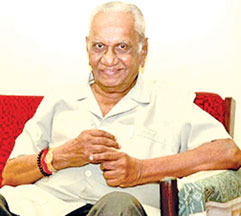The paradox of life and death
 Human and animal life as well is unpredictable. Death can knock at
your door any day any time. As a result, both humans and animals take
precautions to avoid death and live longer. So far nobody has found a
way of living for ever. Human and animal life as well is unpredictable. Death can knock at
your door any day any time. As a result, both humans and animals take
precautions to avoid death and live longer. So far nobody has found a
way of living for ever.
Animals have the natural gift of sensing impending dangers
beforehand. For instance, no animals, except a dog confined to its
kennel, died during the 2004 tsunami disaster. Their sharp sight and
hearing help them to save their lives from predators and dangers.
|

Kalakeerthi Edwin Ariyadasa, doyen of bilingual journalism |
Unfortunately, man is not gifted with sharp sight or hearing faculty.
However, to compensate, nature has given him a brain to think rationally
and invent new ways to lengthen his life. As a result, scientists have
succeeded in prolonging the human lifespan today to a certain extent.
For instance, those who lived in the distant past did not live long. The
maximum number of years a man or a woman could live was about 30 to 40
years.
Exercise
One scientific method that has been discovered is that exercise is
correlated with longer lifespan. Scientists have found that exercise
promoted a diverse array of specific benefits. For instance, an
appropriate exercise program enhances cardiovascular fitness reducing
one's susceptibility to heart attacks. Physical fitness is also
associated with reduced risk for both coronary diseases and
hypertension. On the other hand, regular exercise can contribute to the
avoidance of obesity, diabetes, respiratory difficulties, arthritis and
back-pain.
There is a flip side to this scenario. Those who believe that
physical exercise has no impact on longevity quote the case of Jim Fixx.
He was a celebrated author who touted the benefits of running. However,
he died of a heart attack while out jogging. It is said that people who
never exercised nodded their heads knowingly and made comments about
exercise having little impact on longevity.
Research indicates that you need not be a dedicated athlete to
benefit from exercise. A study by Blair found that even a moderate level
of fitness can be achieved by taking a brisk walk each day. Walking and
swimming are considered the best exercises that will enable people to
enjoy long life.
Prehistoric times
We do not know whether ancient people did exercise to prolong their
life. However, their lifestyle provided them with ample opportunities to
exercise their bodies. Scientists and philosophers from prehistoric
times have died at different ages. For instance, Archimedes of Syracuse
(c. 287 - 212 BC) was a Greek mathematician who lived in Sicily. William
Caxton (c. 1422 - 1491) was the man who brought the new art of printing
from the Continent into England in the 15th century. Those who love
literature and the printed word should pray for him for the invention of
the mechanical printing machine. But none of them lived up to 100 years.
Democritus (c. 460 - 370 BC) was one of the longest living
philosophers. He is often referred to as the 'Laughing philosopher' for
the emphasis he placed on the value of cheerfulness. John Dewy, a
pragmatist philosopher, psychologist and educational reformer lived for
93 years. Sextus Empiricus (c. 100 - 200) was a centurian who expounded
the philosophy of scepticism, founded by Pyrrho around the third century
BC. Willard Van Orman Quine (1908 - 2002) who lived for 94 years, did
not shy away from the conclusion that ontology, the study of what there
is, is relative to the background theory.
Cultural posits
According to him, physical objects and gods differ only in degree and
not in kind. Both sorts of entities enter our conceptions only as
cultural posits. Bertrand Russell (1872 - 1970) too lived for 98 years.
He was a radical liberal and a committed campaigner for nuclear
disarmament. He also won the Nobel Prize for Literature.
This account shows the gradual increase in man's longevity. At the
early stage, most of the well-known men died in their 60s and 70s.
However, in the 20th century the death of eminent people occurred when
they were in their 80s and 90s. To live up to 100 is a great achievement
even in the 21st century.
We have our own eminent men who are now in their 80s and 90s. For
instance, Kalakeerthi Edwin Ariyadasa celebrated his 89th birthday on
December 3. There is hardly anyone who has not heard of him. He is one
of the hard-to-find bilingual journalists who still writes to newspapers
and magazines on a regular basis. He is also equally popular as a radio
and television personality who is aware of modern trends in
communication and international affairs.
Versatility
The knowledge he possesses on such matters is enormous. His
versatility in English and Sinhala has made him a much sought after
writer. He has worked as the editor of Navayugaya and feature writer of
The Daily News and the Sunday Observer.
It is said that a philosopher is not recognised in his own village.
Except for a few titles conferred on him by the government, no
university, now there are dime a dozen, has thought it fit to confer on
him an honorary doctorate to acknowledge his services.
O tempora, O mores! |

